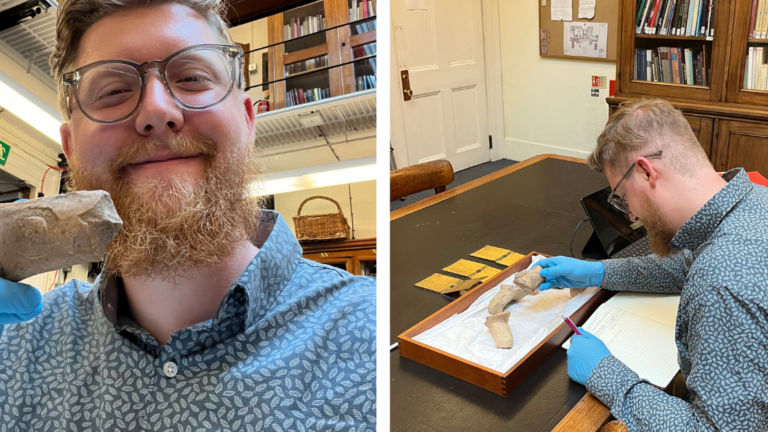
2024 Wrigley Institute Graduate Fellow Maxwell Shiller, a PhD student in the USC Dornsife Department of Classics, studies the interactions between ancient societies and their environment. HIs recent work explores how natural disasters, such as the Rhodian earthquake, shaped political and economic dynamics during the Hellenistic period. (Courtesy of Maxwell Shiller)
Ancient Energy: Earthquakes, Floods, and Food in the Hellenistic World
Energy drives the world, but technology makes it go. From our electric or combustion car engines, the electronic devices with which I write and you read these words, or even the lovely falafel wrap I had for dinner, all are made possible by technological innovations that harness energy.
What the climate crisis has made ever clearer is that the relationship between these innovations and our environment is far from static and is indeed incredibly complex. Our aims to mitigate global warming insist that new technologies solve problems that past inventions have posed.
As a historian, I think that the story ancient Mediterranean societies tell us is more similar than different to our own concerns about the present climate. Ancient societies tried to take advantage of or adapt to their environments. The things they then changed would often have unintended consequences. Domesticate livestock to make food-production more accessible? Best beware new communicable diseases. Plant some tobacco? Issues with soil erosion and nutrient loss might lead to diminishing harvests over the years. My own research explores such historical processes that occurred during the Hellenistic period (323-30 BCE) in the eastern Mediterranean. I particularly focus on Rhodes, in name a city, island, and state. An ancient Singapore if you will.
The Rhodians strategically placed their namesake city at a site that brought three major benefits: a deep natural harbor, a half-bowl shaped topography, and close proximity to modern-day Turkey across a narrow strait. Together, they gave the city a prominent port, the ability to defend the city from elevated positions, and control of trade in the strait. The problem is that the active tectonic fault system that created this useful set of benefits brought earthquakes with it. A particularly concerning earthquake occurred in the 220s BCE. The response was immediate. Concerned about the loss of income that they gained through international trade, kings lavished Rhodes with gifts in coin and materials to rebuild the port swiftly. The amounts sent were unprecedentedly enormous and beg the questions: why had Rhodes come to be so central to the world of Hellenistic trade and how did the response to the earthquake influence its economic and political positions going forward?
I give extensive thanks to the Wrigley Institute for helping me explore these questions through the Sonosky fellowship. I greatly enjoyed my conversations this past year with my fellow fellows, many times being illuminated to ways that broader climatic and environmental issues will shape the questions I hope to provide answers for. The support the Wrigley Institute provided has allowed me to visit the collections of the British Museum and the British Library in London.

At the British Museum, I observed stamped seals on ancient transport vessels called amphorai, which the Rhodians used to ship wine and other goods across the Mediterranean world. Handling and observing these artifacts in person have opened new research avenues and questions about wine export during years of war or poor harvests of other important crops such as grain. I then examined Egyptian papyrus sheets, an ancient type of writing medium similar to paper, that contained accounts of grain collected and the concerns of farmers about their fields. The Egyptian grain trade is closely tied in with the success of the Rhodian state, and reading these documents gives us rare insights into years of good or poor harvest, local conflicts and concerns, and the ability to reconsider ancient accounts in light of climate data. I think particularly of data derived from ice cores, which indicate times of volcanic eruptions through layers of volcanic dust that had fallen onto the area. Such atmospheric dust has a limiting effect on rainfall in the Ethiopian highlands which in turn would reduce the extent of the annual flood of the Nile River. In areas where a low flood meant a lack of water for their fields, such volcanic eruptions and subsequent flood failures could be catastrophic not only to Egypt but also to other Mediterranean societies that depended on imported grain to feed their populations.
To glimpse into ancient Mediterranean trade through these papyri and amphora stamps was an incredible experience that the Wrigley Institute made possible. To have a cohort of environmentally-concentrated scholars from such a broad range of disciplines is a unique and joyful experience. I look forward to seeing what the 2025 cohort of Wrigley Fellows will write about their own work through the fellowship!
Maxwell Shiller is supported by the Diane Sonosky Montgomery and Jerol Sonosky Graduate Fellowship for Environmental Sustainability Research.